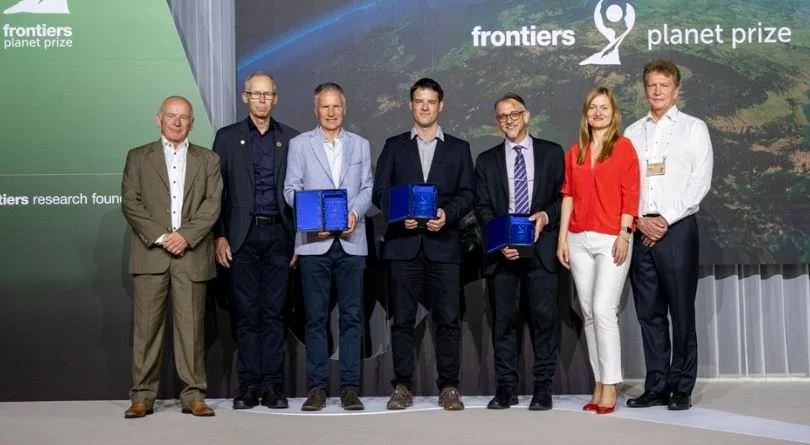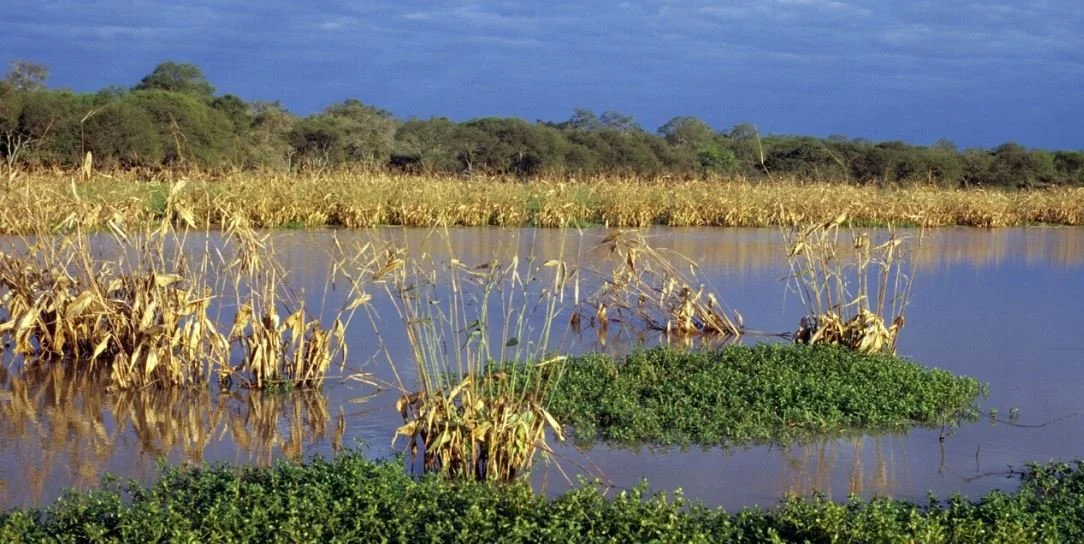News on the Frontiers Planet Prize

Enhancing Fish Populations: Adding Habitats Beats Adding Fish
Robert Arlinghaus from the Leibniz Institute of Freshwater Ecology and Inland Fisheries, National Champion for Germany, discusses his research on ecosystem-based management in freshwater ecosystems. His work highlights the importance of habitat creation over traditional fish stocking practices, and stakeholder collaboration. Through large-scale experiments involving local fishing communities, Arlinghaus demonstrated that ecosystem-based approaches are more effective in promoting fish populations and biodiversity, providing a new direction for sustainable freshwater management.
A Tide of Change: Stories of Marine Conservation Success
Susann Rossbach from Red Sea Global, Lead Author for Saudi Arabia's winning paper, presents compelling evidence that marine conservation success is not only possible, it’s already happening. By analyzing 217 verified case studies, her research reveals the social, ecological, and institutional ingredients behind effective ocean stewardship. Rossbach highlights the power of local engagement, multi-stakeholder collaboration, and targeted action against high-impact pressures like overfishing and pollution, reframing marine conservation as a dynamic, hopeful frontier in achieving global sustainability and staying within planetary boundaries.
SAR11 Bacteria’s Role in Carbon Cycling and Climate Solutions
Paola Laurino from the Okinawa Institute of Science and Technology, National Champion for Japan, reveals groundbreaking insights into SAR11 bacteria, the most abundant microbes on Earth. Her study uncovers how SAR11’s unique transport proteins contribute to their efficiency in carbon cycling and nutrient uptake. These findings have major implications for marine conservation, carbon sequestration, and industrial applications, offering strategies to enhance ecosystem health and mitigate climate change.
The Hidden Costs of Global Trade: Unraveling Supply Chains for a Sustainable Future
Arunima Malik from the University of Sydney, National Champion for Australia, shares critical insights into how international trade shapes progress toward the Sustainable Development Goals (SDGs). Her research highlights the polarizing effects of global supply chains, showing that high-income countries often outsource environmentally and socially harmful production to low-income nations, deepening global inequalities.
Harnessing Planetary Boundaries in Rice Farming
Shabbir Gheewala from King Mongkut’s University of Technology Thonburi, National Champion for Thailand, presents a pioneering planetary boundary-based Life Cycle Assessment (LCA) of rice production in Pakistan, an essential case study in aligning food security with ecological sustainability. As global rice demand rises and agricultural intensification threatens Earth’s systems, his research quantifies the sustainable limits of rice farming to ensure it operates within the planet’s ecological thresholds.
Arctic River Chemistry: A Changing Climate’s Imprint
Suzanne Tank from the University of Alberta, National Champion for Canada, leads groundbreaking work on Earth’s north with the Arctic Great Rivers Observatory. By tracking the chemistry of six major Arctic rivers, her research reveals a systems-level fingerprint of change across vast permafrost and boreal regions. With over two decades of international collaboration, the Observatory’s long-term data series uncovers how climate-driven shifts, like permafrost thaw and changing microbial activity, are altering the Arctic land-ocean system in ways that go beyond rising CO₂ levels.
COVID showed us how ingenuity, speed, and collaboration can save the planet
We must prioritise research and the application of groundbreaking solutions to the climate crisis, and roll them out quickly. The Frontiers Planet Prize recognises scientists for their breakthrough research, collapsing the timeline on scientific consensus, and accelerating global solutions. To learn more about the role of Frontiers Planet Prize in accelerating planetary health action, read this Context Opinion Piece by Jean-Claude Burgelman.
The decade of science for sustainability: The post-2030 agenda
A discussion at the International Science Council Global Dialogue
The partnership between the Frontiers Planet Prize and the International Science Council underscores a shared commitment to advancing scientific solutions for global sustainability. The UN Decade of Science for Sustainable Development (2024–2033) presents a crucial opportunity to sharpen the role of science in this mission. This decade serves as a bridge between the 2015 Sustainable Development Goals and future global frameworks, emphasizing the need for actionable, solutions-oriented research that can drive meaningful change.
Frontiers Planet Prize champion, Professor Jason Rohr, delivers keynote speech at NSS inaugural event
September saw the National Sustainability Society’s (NSS) inaugural conference take place at The University of Washington, Seattle. With over 600 participants, the event brought together academics, students, and practitioners from the private, public, and nonprofit sectors across the field of sustainability.
The society’s mission is simple: to build an organization for shared, integrated, and globally flourishing professional practice and research for sustainability. By focusing on dialog and community building they aim to support professional and scholarly activities that will drive sustainable transformations across sectors.
Overcoming academic challenges to leverage transformational science at the SRI Congress 2024
At the 2024 Sustainability Research and Innovation (SRI) Congress in Finland, the Frontiers Planet Prize led a key panel on overcoming academic challenges to advance transformational science. Moderated by Dr Gilbert De Gregorio, associate director of the Prize, the discussion emphasized the need for flexible funding, multidisciplinary collaboration, and innovative frameworks. Expert panelists, including Finland's National Champion Dr Olga Tammeorg, stressed the importance of breaking academic silos and supporting bold, cross-sectoral research to drive impactful solutions.
No time to waste: Integrating planetary boundary science into policy and practice with the Frontiers Planet Prize
Following the announcement of the 2024 International Champions, a panel session titled “No time to waste,” was held to initiate discussions on how this research can be shaped and amplified to influence policy, the private sector, and civil society for a sustainable future. This article is a summary of the expertise showcased during the panel session, highlighting the need for systemic change for a just transition within the Earth’s ecological boundaries.
Transforming our planet through science: Takeaways from the 2024 Frontiers Planet Prize Award Ceremony
In June 2024, the second edition of the Frontiers Planet Prize Award Ceremony took place in Villars-sur-Ollon, Switzerland. This three-day event brought together 100 leading academics, policymakers, philanthropists, and public and private sector representatives to celebrate the transformational science of this year’s Frontiers Planet Prize National and International Champions. The article summarizes key activities and takeaways from this celebratory event.
Celebrating Transformational Science: Honoring the 2024 International Champions of the Frontiers Planet Prize
The international champions of the 2024 Frontiers Planet Prize are three innovative scientists whose award-winning whose transformational research is influencing policies and practices so we can all live healthier, happier lives on a planet that can sustainably support us. Read this article to learn more about their groundbreaking work and how it influence society and policy.
Insights from Dr. Pedro Jaureguiberry, Frontiers Planet Prize National Champion, on biodiversity loss and planetary boundaries
Pedro Jaureguiberry ,the National Nominee of Argentina to the 2024 edition of the Frontiers Planet Prize, shares insights on his groundbreaking research on the loss of biodiversity.
The pioneers of transformational science: Celebrating the Frontiers Planet Prize 2024 National Champions
The Frontiers Planet Prize celebrates breakthroughs in Earth system and planetary science that address the environmental challenges that humanity is facing and enable society to stay within our planet's safe ecological boundaries. The second edition of the Prize, announced on Earth Day 2024, honors 23 pioneering scientists as National Champions whose research has significant potential in fostering pathways to solutions, through driving systemic change toward a more sustainable future.
A Sustainable Path to Mitigating Climate Change
Yang Ou from Peking University, National Champion of China, shares a multifaceted strategy involving the transition to clean energy, enhancement of energy efficiency, and the adoption of carbon sequestration methods as means to maintaining the Earth’s climate within a safe operating space.
Exploring New Pathways for Science-Governance and Society to Address Multi-Scale Environmental Challenges
Rebecca Gladstone-Gallagher from the University of Auckland, National Champion of New Zealand, shares her research insights on how we can use current ecological knowledge more effectively and find new solutions to environmental and societal problems by addressing the connections between science, governance, and management responses.
Health-informed Predictive Regressions and Building Materials for Decision-making in Urban Heat Mitigation
Umberto Berardi from Toronto Metropolitan University, National Champion of Canada, presents his research assessing a new class of cooling materials that can combat urban overheating and describes how his research supports the decision-making process associated with urban development and heat mitigation strategies.
Restoring Earth’s Damaged Microbiomes
Raquel Peixoto from King Abdullah University of Science and Technology, National Champion of Saudi Arabia, shares why using microbial therapies for microbiome restoration and rehabilitation could be an easy and fast way to restore damaged wildlife and their ecosystems, and how this was successfully demonstrated on coral reefs.
Broadening Our View of Earth’s Biodiversity Will Help Us Maintain Biosphere Integrity
Evan Economo from the Okinawa Institute of Science and Technology, National Champion of Japan, shares his vision for creating a comprehensive “map of life” that will encompass all animal groups on Earth, and discusses how his research on ants could serve as an important stepping stone towards this vision.





















